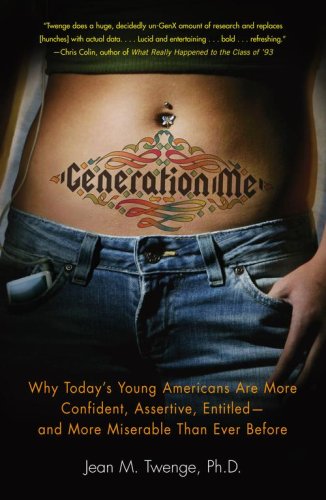All Nonfiction
- Bullying
- Books
- Academic
- Author Interviews
- Celebrity interviews
- College Articles
- College Essays
- Educator of the Year
- Heroes
- Interviews
- Memoir
- Personal Experience
- Sports
- Travel & Culture
All Opinions
- Bullying
- Current Events / Politics
- Discrimination
- Drugs / Alcohol / Smoking
- Entertainment / Celebrities
- Environment
- Love / Relationships
- Movies / Music / TV
- Pop Culture / Trends
- School / College
- Social Issues / Civics
- Spirituality / Religion
- Sports / Hobbies
All Hot Topics
- Bullying
- Community Service
- Environment
- Health
- Letters to the Editor
- Pride & Prejudice
- What Matters
- Back
Summer Guide
- Program Links
- Program Reviews
- Back
College Guide
- College Links
- College Reviews
- College Essays
- College Articles
- Back
Generation Me
Jean M. Twenge has a lot of great ideas in her book Generation Me: Why Today's Young Americans Are More Confident, Assertive, Entitled ' and More Miserable Than Ever Before, however, one large flaw in her work is perspective. Twenge takes such a broad stance on the ethics, emotions, and mentalities of today's youth, a broad spectrum that no one could possibly put a generality to. Grouping people born in the 70s and the people born in the 90s, Twenge has seemingly overlooked the technological advances that shape today's youth that were not around in the 70s.
Twenge makes harsh accusations that our generation is self-centered and egotistical, however, she has only seen a small portion of today's youth. As a 33 year-old professor from the San Diego State University, her claims at understanding the entirety of today's youth is a little over-the-top. Twenge makes remarks about the children who aspire to be doctors and who succeed in school and how they shouldn't be praised too much for their accomplishments because they might take that as they can stop trying so hard.
Twenge repeated returns to the theme that 'work should suck', and how kids should not expect to fall into their dream jobs or find any sort of enjoyment or personal achievement in the career they finally end up in. Plenty of people enjoy their careers, just because maybe her or her friends might not, does not mean that the everyday young adult won't find themselves doing something they enjoy doing.
While discussing individualism, Twenge does not consider the factor of growing and maturing. A survey of teenagers born in the early 70s might result in this conclusion, but if one were to survey the same group of people now, their sights have probably been adjusted to see the big picture now. After college, when everything around a young adult opens up and we come to see how vast the world is and how small of an impact the average person really makes, I'm almost positive anyone with any sense loses their individuality and begins to conform.
Twenge takes a 30 year period and calls it one generation, and then goes on to make generalizations about this generation. When technology really began to expand in the 90s, with the advances in cellular technologies and the internet, the children who are in their teens now are vastly different from those born in the 70s. These two time periods, 70s-80s and 90s-today, should not be put into the same generalizations.
Overall, Jean Twenge's book is captivating and interesting. However, she missed the mark in unwrapping 'Generation Me'.
Similar Articles
JOIN THE DISCUSSION
This article has 0 comments.

